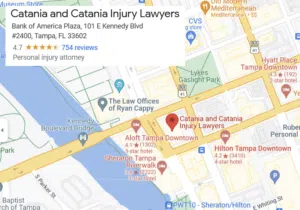
Attorneys are not perfect. They can make mistakes. Furthermore, lawyers cannot guarantee a specific outcome in a case.
However, when a lawyer fails to provide adequate legal services, the client might have a legal malpractice case. Losing your case is not sufficient to prove legal malpractice. Likewise, dissatisfaction with an attorney’s methods is not grounds for legal malpractice claims.
Malpractice occurs when a professional fails to perform their duty to a client. In short, if your attorney screwed up your case, you might have a valid reason for suing your lawyer for damages.
Table of Contents
Examples of Legal Malpractice in Tampa
Legal malpractice can take many forms. For example, when an attorney fails to act with reasonable care, the result could be malpractice.
Examples of situations that could lead to a legal malpractice claim include:
- Violating the attorney-client privilege
- Failing to file a lawsuit before the Florida statute of limitations expired
- Failing to check for a conflict of interest
- Failure to meet court deadlines or file required documents with the court
- Mishandling funds paid as a retainer or held in trust for a client
- Failing to attend court hearings
- Incorrectly applying statutes or case law to the client’s case
- Failure to conduct an investigation or adequate discovery in a case
- Committing fraud or intentionally misleading a client
- Failing to obtain a client’s consent to settlement, filing a lawsuit, or other matters
- Failure to present a client with all settlement offers
If you believe your attorney failed to provide adequate legal services, it is essential to seek legal advice as soon as possible. It can be hard to win a malpractice case without sound legal counsel. You have the burden of proving your lawyer committed malpractice before you can recover compensation for damages.
How Do You Prove Legal Malpractice in Florida?
To win a legal malpractice lawsuit, you must prove the five elements of a malpractice claim:
Attorney Client Relationship

You must have had an attorney-client relationship to qualify for malpractice. Answering a legal question at a dinner party or responding to a question on an online forum may not be sufficient to establish an attorney-client relationship.
In most cases, signing a retainer agreement and/or paying a retainer fee triggers an attorney-client relationship. There must be some evidence you hired the attorney to handle your case and the attorney agreed to take the case.
Duty of Care
An attorney-client relationship creates a duty of care. A duty is the requirement to adhere to a standard of care. For example, attorneys have a duty to act with reasonable care to protect the client’s best interests.
Breach of Duty
A breach of duty occurs when a lawyer’s conduct falls short of the acceptable standard of care for a given situation. An attorney may breach their duty of care by acting negligently or failing to do what they were contracted to do.
Lawyers may breach the duty of care through incompetence and dishonesty. They may provide inadequate legal services or fail to meet professional standards.
Causation
You must prove that the attorney’s conduct was a direct and proximate cause of the harm you suffered. In other words, you will need evidence linking the breach of duty to identifiable harm.
Damages
You must have sustained damages in the form of financial losses. The financial losses must be compensable in a legal malpractice case.
What Types of Damages Can I Recover for Legal Malpractice?
The types of damages you might recover for a legal malpractice claim in Florida include economic damages and non-economic damages. However, you cannot recover punitive damages.
Economic Damages for a Legal Malpractice Claim
You cannot receive compensation to pay another attorney to handle your case. However, you can include attorneys’ fees for filing the legal malpractice claim and the fees you paid to remedy the situation caused by the attorney’s malpractice.
Economic damages also include the financial losses related to the malpractice. For example, you may recover compensation for lost wages if the attorney’s malpractice caused you to miss time from work.
Non-Economic Damages for a Legal Malpractice Claim
You may also be entitled to compensation if the legal malpractice resulted in emotional distress. For example, suppose you experienced stress, chronic anxiety, or depression because of the situation. The lawyer may be responsible for compensating you for these emotional losses and non-economic damages.
When Can I Fire My Lawyer?
If you are unsatisfied with the legal representation from your attorney, you may fire your lawyer at any time. First, however, make sure that you have another attorney willing to take your case. Firing a lawyer without having another lawyer ready to step in to handle the case could be a risky move.
Also, make sure to sign a release and authorization for your new attorney to receive all documents from your pending case. You are entitled to receive your information and documentation, even if you have a pending legal claim against the attorney or a dispute regarding fees.
It can be difficult to know when to fire a lawyer. Failing to respond to your calls or emails can be a sign of trouble. Likewise, failing to keep appointments, appear at court hearings, or keep you informed about your case’s progress could be a warning sign.
If you believe your attorney is not handling your case properly and your attempts to communicate with your lawyer are ignored, you might want to talk with another lawyer. Taking action as soon as you suspect a problem could save your case.
Contact Us for a Free Consultation With a Tampa Legal Malpractice Lawyer
Do you have questions about a legal malpractice case? Contact our law firm to schedule a free, no-obligation case evaluation with one of our experienced legal malpractice attorneys in Tampa. We want to help you recover the compensation you deserve.




